Women, immigrants and minorities were all targeted by Donald Trump during his presidential campaign.
The environment, the freedom of the press, and reproductive rights were also singled out. With Trump backed by a Republican-controlled House and Senate, the people and issues he has targeted over the past 18 months are at real risk.
Here are some of the people and groups who are already leading the progressive fights on these and other issues, and how they’ll lead the resistance against a President Trump.
Bob Libal – immigration
Executive director, Grassroots Leadership
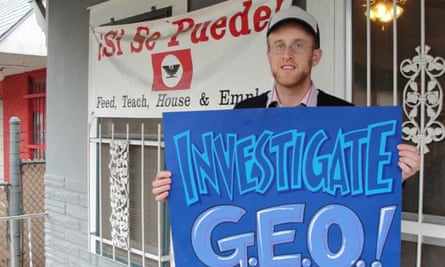
Based in Austin, Grassroots Leadership works to stop prison profiteering, mass incarceration and deportation. The organization successfully campaigned to stop immigrant families being detained at the T Don Hutton Detention Center in Texas in 2009.
Since Trump’s election, the group has been providing “sanctuary in the streets” training to residents. The plan is to build a network of activists – Grassroots Leadership aims to have 500 people signed up in the next two months – who will “literally put their bodies on the line” to prevent immigrants from being arrested or deported.
“We’re training people in every part of the city to be responsive should there be a raid, so people can get a call and actually turn out,” Libal said. Activists will then engage in “non-violent disobedience”, such as sitting between law enforcement officers and their suspected targets.
“Regardless of where you are, there is probably an immigration rights organization,” Libal said. “Find that organization and get involved. Because even in a time when federally things look pretty bleak, we have infinitely more power locally, and we need to turn our energies into ensuring people in our immediate communities are safe.”
Kelly Baden – reproductive rights
Interim senior director of US policy and advocacy, Center for Reproductive Rights

Donald Trump has been inconsistent on the issue of abortion, but his vice-president-elect, Mike Pence, is vehemently anti-abortion, promising during the election campaign that a Trump victory would “see Roe v Wade consigned to the ash heap of history”.
The Center for Reproductive Rights (CRR), founded in 1992, uses legal action to protect women’s rights, bringing cases and fighting legislation at the state and federal level.
“The Trump administration is a tremendous threat to reproductive health rights and justice,” Kelly Baden said. She said Trump’s planned dismantling of the Affordable Care Act would have an impact on the cost of healthcare for women, affecting measures such as the no co-pay contraceptive coverage benefit.
“The Center for Reproductive Rights will be doing what we’ve always done, which is really using the law to advance reproductive freedom as a fundamental right which the government would respect,” Baden said.
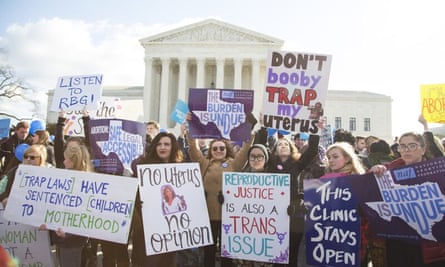
She said that the CRR was already seeing some state lawmakers “double down” on submitting anti-reproductive rights legislation since Trump had been elected. The CRR has responded by filing legislation, along with Planned Parenthood and the ACLU, against “medically unnecessary abortion restrictions” in three states. They also challenged the “legal funeral” requirement in Texas – a law which requires fetal remains to be cremated or buried – although that law ultimately passed.
Alongside legal action, Baden said the CRR would be doing “bread-and-butter civic participation”, encouraging people to call their members of Congress to tell them they support Planned Parenthood and access to healthcare.
“It seems like a dark time, and it is because the threats are very real,” Baden said. “But there is also an incredible amount of energy and motivation right now, and that should give us all hope.”
Umi Selah – racial justice
Co-director, Dream Defenders

Founded in 2012, Dream Defenders is a Miami, Florida-based organization “dedicated to defending the dream etched in our memories by Dr Martin Luther King”. The group has focused on curbing police shootings of young black men. In August, the Dream Defenders and 50 other organizations launched A Vision for Black Lives, a platform that set out policies to improve conditions for black people in the US.
“We’re going to have to prepare ourselves for even more traumatic and deadly police overreach, for over-policing, police brutality in our communities, especially our poor communities,” Umi Selah said of Trump’s presidency.
Selah noted Trump’s full-throated defense of police during his campaign. “That’s something we have to be really fearful of,” he said. “Of [Trump] following through on his promise to really reinstitute the police as this really angelic profession that’s above the law.”
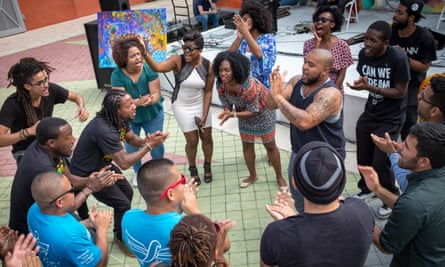
In a bid to combat the dangers of Trump’s presidency, Dream Defenders has been building relationships with activists in the US and abroad. The group has travelled to Brazil, Mexico and Palestine to meet progressives to “build international solidarity” with people “who frankly are seeing the same kind of leaders rise to power in their countries”. In February, Selah will spend time with movement leaders in London.
On a more local level, Dream Defenders holds monthly and weekly meetings and also uses more innovative methods of engagement. The organization hosts house parties in Miami, where it shares information about shootings, private prisons, and the state of the education system. Dream Defenders has even launched a clothing line to help spread its message.
George Goehl – grassroots organizing
Co-director, People’s Action
People’s Action, a progressive organization with more than a million volunteers and 600 paid organizers, has already begun to fight against Trump. The group, which describes itself as a “national, working class, grassroots advocacy organization”, is launching weekly “resist Trump Tuesdays” in more than 100 cities across the US on 24 January.
The sessions, which People’s Action is running alongside the Working Families Party, will offer training to volunteers in non-violent direct action and educate people on key issues such as healthcare and immigration.

“I think right now people on our side need some predictable things that they can plug into,” Goehl said. Along that line, People’s Action is holding a three-day event in Washington DC in April – the “Rise Up Convention” – where thousands will gather to discuss and plan how to combat the Trump administration.
Goehl said People’s Action would also be “going into what might be what called Trump country”. Volunteers will be going door-to-door and working with “institutional leaders” in rust belt states and elsewhere that have traditionally been Democratic but voted for Trump in 2016.
The aim, Goehl said, is “exposing the gap between what Trump said about draining the swamp, or holding the banks accountable, or ending things like tax loopholes and just exposing the dissonance between what he said and what he’s really doing”.
Angelo Carusone – media
President, Media Matters for America
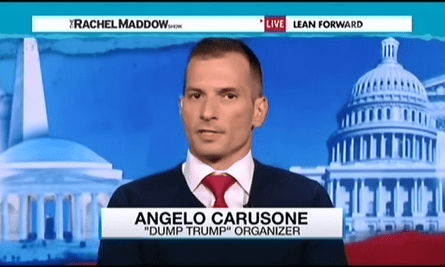
Media Matters, a journalism watchdog with progressive roots, sees its role as “covering and correcting conservative misinformation in the media”. With the rise of the “alt-right” and fake news – and the election of Trump – Carusone said the organization would move beyond merely covering that misinformation to – in some cases – actively working to bring change in the media.
“In previous administrations, there have always outside groups, rightwing groups who are supportive of the leadership’s agenda,” Carusone said. “That’s not the case here, though. Steve Bannon [the former executive chair of Breitbart News] is in the White House. Donald Trump’s own campaign is a purveyor of fake news.”
Carusone said some media organizations had not been critical enough of Trump. Media Matters will be “calling out the normalization” of far-right ideas and policies, he said. Carusone added that the organization would be “getting bigger and louder so we can blunt and neutralize some of the effects of the bad actors”.
In January, Media Matters launched a petition calling for the White House Correspondents’ Association, an organization of journalists who cover the president, to take stronger action if Trump “blacklists” media organizations. The petition came after Trump refused to take a question from a CNN reporter at a press conference on Wednesday.
“Stand up and fight back,” Media Matters wrote to the correspondents’ association. “Amplify your colleague’s inquiry or refuse to engage until he removes that person/outlet from the blacklist.”
Winnie Wong – grassroots organizing
Co-founder, People for Bernie
Independent grassroots groups formed a huge part of Bernie Sanders’ rise during the Democratic primaries. People for Bernie, with more than 1m Facebook followers and a savvy social media presence, was one of the most important. “The crucial thing that needs attention is a strategy to win in 2018,” said Winnie Wong, who founded the group.

Wong said People for Bernie’s main focus would be making sure people who came into politics through Sanders in 2016 stay involved in activism.
“We need to make sure that people are engaged in the political process. Not just by clicking or retweeting or writing a Facebook post, but that they actually engage and volunteer for down-ballot candidates and do things like door-knocking and phone-banking.”
People for Bernie is working with people who worked on Sanders’ primary campaign and National Nurses United to “develop a more cogent strategy” to make this happen, Wong said.
Carlos Jesus Calzadilla – campus organizing
Founder, Young Progressives of America
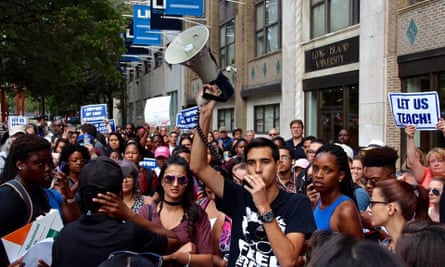
Calzadilla, a freshman at Long Island University, campaigned for Bernie Sanders and the Floridian congressional hopeful Tim Canova during their primary campaigns. Calzadilla set up the young progressives of America at LIU’s Brooklyn campus at the end of 2016. The organization plans to “be the resistance against Trump’s reactionary rightwing agenda”.
The group aims to spread to other campuses in New York City and organize protests, rallies, petitioning and lobbying against “every instance where [Trump is] going to attack minorities or he’s going to be hurting people or he’s going to be attacking groups that have a lot less power”.
Desiree Kane – environmental justice
Activist, NoDAPL, Oceti Sakowin camp

In December, after months of protest by thousands of people, the US Army Corps of Engineers said it would not allow the Dakota Access pipeline to run under a river close to the Standing Rock reservation in North Dakota. The decision brought to an end police violence toward protesters, but activists like Kane, who plan to remain in North Dakota to protest the rerouted construction of the pipeline, now worry about what is going to happen next.
“I am extremely concerned about what the Trump administration is going to do,” said Kane, a Native American who has been based at the Oceti Sakowin camp for the past seven months, resisting the construction of the pipeline and documenting the protests.
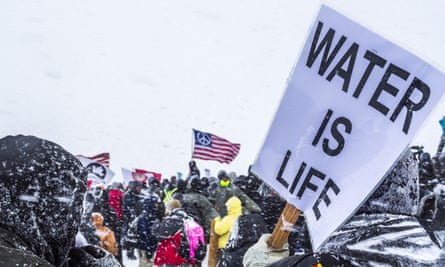
“He can empower the Morton County sheriff,” Kane said, referencing the North Dakota law enforcement agency that in November used teargas, rubber bullets and water cannon on protesters Standing Rock.
“They’re going to be like: ‘Well, it’s a friendly administration so we can kind of do whatever we want.’ It’s really scary.”
Trump’s administration has indicated it will review limits imposed by Barack Obama on oil drilling, and Kane said climate activists will continue to protest and demonstrate at different sites in response to “bad policies” the government might pursue.
